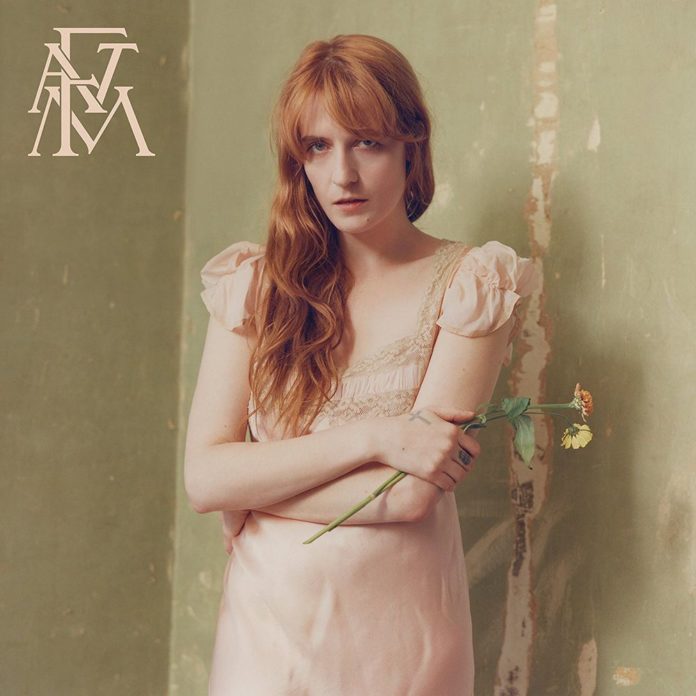High as Hope is the fourth studio album from Florence + the Machine, as well as the band’s most personal LP to date. It’s been 10 years since debut album Lungs was released, and gone are the days of synth heavy pop anthems and grand metaphorical lyrics, detailing the chaotic turbulence of frontwoman Florence Welch’s complications in life and love. Now, Welch has toned down her sound and crafted an album rife with deeply personal confessions and stripped back production. This album is by no means dull, however. Instead, Welch presents a vast musical landscape that shows off her vocal abilities perhaps more prominently than any previous LP. Welch’s soulful voice manages to transition effortlessly from the soft murmurs of quiet confessions to the glass shattering howls that her iconic voice is so known for. Only this time, instead of covering herself in layers of metaphors and overpowering choruses, Welch presents herself in a raw and vulnerable state that she had never been able to achieve before now due to her chaotic lifestyle.
After the touring for her third LP, How Big, How Blue, How Beautiful, Florence Welch stopped drinking and partaking in the wild shenanigans she had been so accustomed to up until that point. In various interviews, Welch stated that she ran on a “chaos engine” and felt like she had to be unhappy in order to make music. With the new mindset that came with sobriety, she was finally able to write and sing about herself in a naked light, unshrouded by the mystical and magically religious imagery she had used in her previous work in order to hide her true intentions. Lead single “Hunger” begins with the line “At seventeen I started to starve myself/I thought that love was a kind of emptiness.” With this cry of confession, there’s no longer any room for interpretation, and Welch saturates the album in personal revelations and truths of a troubled past. “South London Forever” is a poetic wave of nostalgia set to a steady drum beat, as Welch details the places and people she grew up with and the transformative moments of her teenage years. “We were high on E and holding hands/With someone that I just met/It doesn’t get better than this.” Although her youth was a time of chaotic experiences, it formed her into the artist she is today. She acknowledges this fact and appreciates her formative years for what they were. Welch analyzes her own thoughts and experiences in the latter half of the song, crying “But did I dream too big?/Do I have to let it go?/Oh God, what do I know?” She isn’t only detailing the raw expressions of her past, she’s accepting them for what they are and using them to become a better person in the present. This new writing style is refreshing from an artist who is used to belting vocal lines about witches, cathedrals, and all forms of mythical symbolism, and it allows Welch to distance herself from her powerful musical persona and be seen as human; as deeply flawed and remorseful as the rest of us.
Although the lyrics on High as Hope are much barer, the production quality is just as lush as ever. Welch worked with co-producer Emile Haynie who helped with the sweeping orchestral backings, as well as artists such as Kamasi Washington, Sampha, and Jaime XX who peppered the album with small moments of jazz instrumentals and woozy synth vocals featured in songs like “June”, “Patricia”, and “Big God.” The latter track is a slow burner that eventually explodes in a sultry force that beautifully encapsulates the mixture of anger and self-realization that comes from being ghosted. And despite the new, more introspective sound of the record, this is still Florence Welch we’re talking about, and she leaves enough room on the album to blow the roof off. Standout track “100 Years” is reminiscent of early Florence, complete with hand claps, wailing howls, and earth-shaking drum beats that could topple a building. And pre-closer “End of Love” features a sprawling layered vocal chorus that could melt even the hardest of hearts.
Everything comes down to the closing track, however. “No Choir” is the shortest song on the album, but leaves the biggest impact. Welch sings about the fact that, through the past 10 years of chaos, heartbreak, and self-destruction, being happy is the one thing she can’t blow out of proportion. The entire Florence + the Machine discography is a grand cathedral of sound that explodes with pain, heartbreak, and love. But “No Choir” is more than just an end to an album, it’s an end to Welch trying to push past her emotions. She’s learned to let the moments of bliss come and go; accepting them without all the pomp and circumstance of trying to understand them. High as Hope ends in the same way these past 10 years have ended for Florence Welch; with her humming quietly along to her own happiness.


